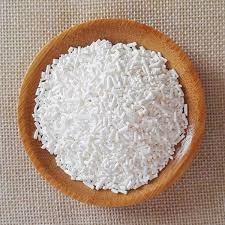
Similar to Trichloroisocyanuric Acid for Effective Water Disinfection and Sanitation Solutions
Trichloroisocyanuric Acid Properties, Uses, and Safety
Trichloroisocyanuric acid (TCCA) is a multifaceted chemical compound with a variety of applications, particularly in water sanitation and disinfection. A member of the isocyanuric acid family, TCCA is known for its three chlorine atoms, which contribute to its strong disinfecting properties. As an organic chlorine compound, it plays a crucial role in ensuring public health, especially in environments where clean water is essential.
One of the primary uses of trichloroisocyanuric acid is in the treatment of swimming pool water. As a powerful chlorinating agent, TCCA helps to eliminate harmful bacteria, viruses, and algae that can proliferate in pool environments. By maintaining proper chlorine levels, TCCA not only protects swimmers from potential infections and illnesses but also contributes to the overall clarity and quality of the water. Thanks to its slow-release properties, trichloroisocyanuric acid can provide prolonged disinfection, making it an efficient choice for pool maintenance.
Beyond swimming pools, TCCA finds its application in various water treatment processes. It is frequently used in municipal water systems to disinfect drinking water, thereby enhancing public health. When released into water, TCCA dissolves and releases chlorine, which readily targets pathogens. Its effectiveness against a wide range of microorganisms is well-documented, providing reassurance that water sanitized with TCCA is safe for consumption and recreational use.
trichloroisocyanuric acid

In addition to its role in water treatment, trichloroisocyanuric acid is valuable in other industrial applications. It is employed in the manufacture of bleach and cleaning products, enhancing their effectiveness. Furthermore, TCCA is utilized in the food processing industry, helping to sanitize equipment and surfaces where food is prepared. This application is critical in preventing foodborne illnesses and ensuring safe food distribution.
Despite its benefits, handling trichloroisocyanuric acid requires caution due to its potential hazards. As a chlorinated compound, TCCA can be corrosive, particularly to metals and other materials. Proper storage conditions are essential to avoid accidents, including the need to keep it out of reach of moisture and organic compounds that could cause unwanted reactions. Additionally, individuals working with TCCA should wear adequate protective gear, including gloves and masks, to guard against exposure to dust or vapors.
Environmental considerations also come into play with the use of trichloroisocyanuric acid. While it effectively disinfects, the release of chlorine residues can be a concern for aquatic ecosystems. To mitigate these effects, it is crucial to follow recommended dosing guidelines and regulations surrounding its use. Responsible management and adherence to safety protocols can help balance the benefits of TCCA against its environmental impact.
In conclusion, trichloroisocyanuric acid is a valuable chemical compound that serves diverse roles in water treatment, sanitation, and industrial applications. Its strong disinfecting properties make it a go-to choice for maintaining safe water in swimming pools and municipal systems. However, responsible handling and disposal practices are essential to prevent potential hazards to human health and the environment. As we continue to seek effective methods for ensuring public health, trichloroisocyanuric acid remains an integral part of our sanitation toolkit, blending efficacy with the responsibility of safe usage.
-
Buy High-Quality Trichloroisocyanuric Acid for Sale | TCCA 90% SupplierNewsAug.30,2025
-
Pure Sodium Dichloroisocyanurate Dihydrate | Powerful DisinfectantNewsAug.29,2025
-
Industrial Chemicals: Quality & Purity for Every IndustryNewsAug.28,2025
-
Nitrile Rubber Honoring Strict Production StandardsNewsAug.22,2025
-
Aspartame Ingredients Honoring Food Safety ValuesNewsAug.22,2025
-
Fertilizer for Balanced Plant NutritionNewsAug.22,2025
-
Cyanide Gold Processing with High Purity AdditivesNewsAug.22,2025
Hebei Tenger Chemical Technology Co., Ltd. focuses on the chemical industry and is committed to the export service of chemical raw materials.
-

view more DiethanolisopropanolamineIn the ever-growing field of chemical solutions, diethanolisopropanolamine (DEIPA) stands out as a versatile and important compound. Due to its unique chemical structure and properties, DEIPA is of interest to various industries including construction, personal care, and agriculture. -

view more TriisopropanolamineTriisopropanolamine (TIPA) alkanol amine substance, is a kind of alcohol amine compound with amino and alcohol hydroxyl, and because of its molecules contains both amino and hydroxyl. -

view more Tetramethyl Thiuram DisulfideTetramethyl thiuram disulfide, also known as TMTD, is a white to light-yellow powder with a distinct sulfur-like odor. It is soluble in organic solvents such as benzene, acetone, and ethyl acetate, making it highly versatile for use in different formulations. TMTD is known for its excellent vulcanization acceleration properties, which makes it a key ingredient in the production of rubber products. Additionally, it acts as an effective fungicide and bactericide, making it valuable in agricultural applications. Its high purity and stability ensure consistent performance, making it a preferred choice for manufacturers across various industries.





